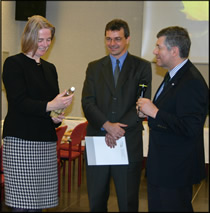 |
Prior to her postition as Director
General for DG Environment, Catherine Day was active in DG External
Relations and DG Enlargement. |
That Catherine Day, Director-General of the Directorate General for the Environment
of the European Commission, assumes the position of the ICPDR President
in the year in which four Danube Basin countries are due to join the EU,
sends an important political message. It reflects the importance the EU
attaches to the work of the ICPDR. Danube Watch interviewed Ms. Day to find
out more about the new President's programme.
DANUBE WATCH: Welcome
to your new position, Ms. President. Why have you taken on this position
despite your very busy schedule as Director General?
CATHERINE DAY: The
Danube has great historical, economic, environmental and cultural significance
for the European continent; its protection is vital if we are to promote
sustainable development in the region. The establishment and development
of the ICPDR is a remarkable achievement, which has served as a model for
co-operation on other transboundary rivers. It shows that co-operation for
environmental protection can transcend political and ideological borders
and contribute to peace and stability. It is a great honour, for the European
Commission and for me personally, to be taking on the Presidency. I am excited
at the prospect of being in the chair when four Danube Basin countries become
members of the European Union. The role and importance of the ICPDR will
grow in the coming years. The Commission will continue to play a key role
in the implementation of European water policy and will strengthen co-operation
between the enlarged European Union and its direct neighbours. This is a
huge challenge and I am looking forward to being part of this ambitious
project.
DANUBE WATCH: The last President
has put a lot of professional and personal effort in encouraging active
involvement of the downstream countries in the ICPDR. What goals will you
personally emphasise during the 12 months of your presidency?
CATHERINE DAY: Let
me first thank Fritz Holzwarth, the previous President for his commitment
and his excellent work. I would like to continue to develop some of the
policy lines that he initiated and in particular: raising awareness and
strengthening political commitment, continuing the dialogue with the Balkan
countries and promoting EU sustainable development policy in the Danube
Region.
I am committed to raising awareness about the importance of the ICPDR. I
think that the first Danube Day, which will be held on 29 June 2004, and
the Ministerial Meeting at the end of the year, will be important and very
visible events contributing to this goal. They will both mark and celebrate
the tenth anniversary of the signing of the Danube River Protection Convention
in Sofia. The European Commission will be fully involved in these events
and the activities associated with them.
I would like to continue the dialogue with the downstream countries outside
the EU in order to encourage and help them in their efforts to contribute
to the ICPDR objectives. My intention is to focus on the Southeast European
countries of the Balkan region in particular.
I would like to promote sustainable development in the whole Danube catchment
area. This is important for environmental and water protection. In the EU
we have a clear, long-term policy built around the concept of river basin
management. This is set out in our Water Framework Directive, adopted in
2000. All Danube River countries are committed to implementing this same
policy, which gives the ICPDR a central ICPDR Presidency 2004 – EU
succeeds Germany On Friday, January 23, a bottle of Danube water was handed
over from Fritz Holzwarth to Catherine Day.With this symbolic gesture, the
ICPDR 2004 Presidency was taken over by the European Commission role to
play in our joint efforts to reach the shared goal: good ecological status
for the entire Danube Basin by 2015. Of course, water policy is closely
linked to many other policy areas so we need an integrated approach if we
are to succeed.
 |
Philip Weller watches as Fritz
Holzwarth and Catherine Day engage in the symbolic handover ceremony |
DANUBE WATCH: With the enlargement
of the EU in May 2004 the political situation of the Danube River Basin
will be changed. How can the ICPDR ensure that the principles of sustainable
development are not overruled and that progress in reducing the pollution
of the Danube is sustained?
CATHERINE DAY: Our
challenge is to find ways of continuing to enjoy high levels of economic
growth and rising living standards without damaging our environment. We
have not achieved the right balance in the past but we must find a better
way for the future. Before I became Director General for Environment, I
worked on the preparation of the enlargement process. One of the key activities
of the EU was to establish financial instruments to help the candidate countries
make the necessary changes in infrastructure and administrative capacities
in order to join the Union. Environmental protection has always been high
on the agenda and has already brought important health and environmental
benefits to our new Member States. For example, in the water sector, substantial
amounts of money have been made available to fund investment in wastewater
treatment plants and drinking water supply. A key initiative of the European
Commission was the establishment of the Danube-Black Sea Task Force (DABLAS)
in 2001. The main aim of DABLAS is to provide for better coordination of
financial assistance in the region as well as better coordination between
the ICPDR and the Black Sea Commission. The ICPDR has played an important
role in identifying existing pollution problems and funding priorities.
During our Presidency, we will present the results of this initiative and
seek political support for continuing this useful contribution to reducing
pollution of the Danube and the Black Sea.
DANUBE WATCH: After the May 2004 enlargement, the
Danube Basin will be shared by countries enjoying a different political
status: EU Member States, Accession Countries and countries with no aspiration
to join the EU. How will this political fact influence the work of the ICPDR?
CATHERINE DAY: With the extension
of its borders, the European Union will have new neighbours. It is very
important that we continue to maintain good and close cooperation with our
neighbours, irrespective of whether or not there is a long-term prospect
of their EU membership. We already have a common vision of how we want to
see the Danube River Basin develop and the EU Water Framework Directive
gives us the means to implement the vision. DANUBE WATCH: Active involvement
of the public in decision-making processes is one of the guiding principles
of the EU Water Framework Directive. Is this principle also applicable in
the young democracies of Central and Eastern Europe?
CATHERINE DAY: The
principle of public participation in environmental policy making has been
recognised internationally through the Aarhus Convention of the UN Economic
Commission for Europe (UNECE). Most Danube riparian countries, including
the EU, have signed the Convention. I believe that its principles are universal
and essential for good governance in the field of environment. However,
putting these principles into practice will pose a huge challenge because
the ways in which we inform and involve the public varies from one European
country to another. In this sense, too, the ICPDR can play a useful role
in promoting access to environmental information and encouraging public
participation in managing our water resources. The ICPDR Public Participation
Strategy is a good example of ways to inform and involve the public.
DANUBE WATCH: Thank you Ms. Day and all the best
for your Presidency!